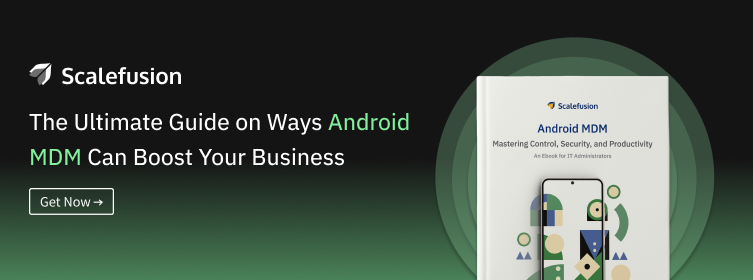Businesses these days deploy digital devices for diverse purposes. Android devices have become famous for business deployments owing to their flexibility of use and economical pricing. However, no matter how a business deploys its Android devices, continuous monitoring is a crucial part of the process. Android devices deployed as digital kiosks or provided to employees for remote work are vulnerable to a variety of security risks, as well as technical crack-ups.

When considering large-scale Android deployments, it is important for businesses to plan a mitigation strategy. Configuring alerts for your Android devices using an MDM solution prevents IT admins from constantly keeping an eye on their device fleets. Android MDM alerts generate automatic notifications for your IT admins which can reduce labor costs, prevent device downtime and improve business productivity.
How Do Android MDM Alerts Affect Your Business?
Configuring alerts for your Android devices using an MDM solution can save your IT team’s time and effort spent on constant manual monitoring. IT teams need not spend their time constantly monitoring and refreshing pages to keep an eye on your remote devices. Whenever a device experiences a technical issue or enterprise policy breach, an email or notification will automatically be shared with the IT admin.
Whether your public-facing kiosk runs into errors, or whether your employee accidentally breaches an enterprise policy, IT admins can immediately be made aware with instant alerts to take the necessary actions. The main advantage of Android MDM alerts is that you can mitigate problems before they hamper your customer experience or business productivity.

Top Android Alerts for Your Business
1. Device Inactivity
Creating a compliance alert based on the inactivity of the device helps businesses track inactive public-facing kiosks. If any of your deployed digital kiosks has run into a technical error causing it shut down, it can be traced using this alert. Similarly, employers can configure the device inactivity alert to keep a track of their employees’ daily performance.

2. Data Usage
Excessive data usage is one of the primary suspicious activities that businesses need to look out for. Employees’ Android work devices that have been lost, stolen or compromised in any way can be targets of cybercrimes and data theft. Drive-by malware results in unintentional and uncontrolled downloading of malicious codes on the user’s device. To be alerted about suspicious data usage, businesses can configure alerts keeping in mind the estimated data usage for specific use-cases.
Real-time alerts generated when your company’s Android devices exceed a defined data usage limit can help the IT teams trace devices to scan for any skeptical behavior. Sharing large files and downloading irrelevant or untrusted apps and software can be instantly detected with such alerts.
3. SIM Swaps
Businesses that provide their employees with company-owned Android devices generally offer devices that are pre-bundled with SIM services. Some employees may switch the SIM cards from their work devices to their personal devices to take advantage of the company’s cellular data and phone bills. To prevent their pre-installed SIM services from being misused, businesses can generate Android MDM alerts for SIM removal or replacement.
4. Battery Status
When Android devices are deployed as digital kiosks, they are generally unattended and are plugged into a power source at all times. However, if the battery of your Android kiosk drops suddenly below the defined levels, it indicates an issue with the device. Because digital kiosks are unattended, MDM alerts for battery status can help businesses remotely identify problems with the device and take actions to fix them.
5. Storage Capacity
The Android device storage space directly affects the speed and performance of the device. Rapidly consumed storage space can be an indication of unauthorized access and improper device usage. Configuring Android MDM alerts for storage limit can help businesses detect storage consumption of their Android devices.
6. Geofence Breaches
One particular Android MDM alert that can help businesses monitor the movements of their frontline employees is Geofence-based alerts. Businesses can configure alerts to be generated whenever any of their employees happen to breach a particular Geofence. This feature has immense applications in businesses such as last-mile delivery, cab services, logistics, etc.
Scalefusion Workflows for Android Alerts
Based on your business use case and the type of Android device deployment, your MDM alerts can vary. Scalefusion MDM helps businesses generate a variety of compliance alerts. You can create and schedule Workflows via the Scalefusion dashboard in a few steps and take your Android device monitoring to the next level.
Scalefusion offers the Remote Cast & Control feature that complements the Android MDM alerts and helps IT admins fix Android device issues faster. This ensures that your employees do not lose their productivity due to device issues. It also ensures that your public-facing kiosks are always maintained at their best health.
Closing Lines
Allowing your employees to access corporate data on digital devices remotely or installing unattended public-facing kiosks for your customers are critical business decisions. Businesses can confidently deploy their Android devices with the help of stringent monitoring. Configuring Android MDM alerts is a simple and efficient way to monitor your remote devices.

